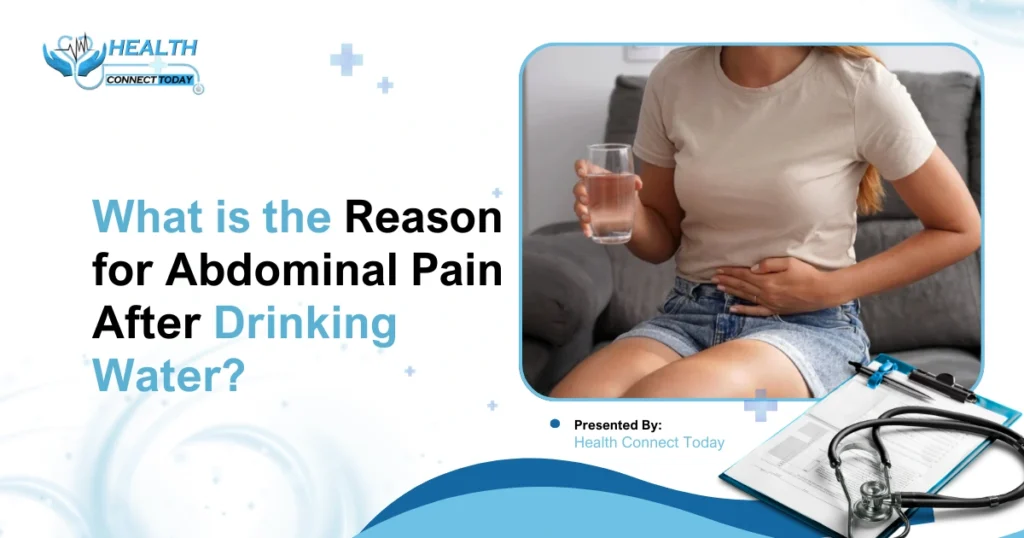Ever felt pain after drinking water in your abdomen? That can be very stressful, especially when hydration is of high importance in our well-being. Here, in this blog post, we will discuss reasons why drinking water might lead to some abdominal discomfort: the types of pains, potential diseases which can cause abdominal pain after drinking water and when you should seek medical assistance.
Common Causes of Abdominal Pain After Drinking Water
Swallowing Air
Sometimes, there is a very simple explanation for why someone experiences abdominal pain after drinking water: it may simply be that one swallowed air. This may occur due to drinking too fast or speaking while people drink. When the air reaches inside the stomach, it may cause bloating and pain in the region of the abdomen, causing people to ask: does drinking cause abdominal pain? The answer in most cases is yes, but normally, it is short-lived and then goes away.
Water Temperature
Some people claim that they get abdominal pain after drinking cold water. In some cases, cold drinks can make the stomach contract, causing spasms or aching. If you find that upper abdominal pain with water drinking is your weak spot, try room temperature or warm water instead.
Overhydration
While hydration is good so can drinking excess water lead to abdominal pain? Sure thing. Overhydration may cause the stomach and intestines to be stretched, which may bring discomfort. In fact, if water consumption leads to severe abdominal pain, this may be a sign that your body has had enough.
Gastrointestinal Conditions
Several diseases concerning the gastrointestinal tract can actually lead to a condition of abdominal pain due to water consumption. For example, the disease condition termed gastritis or irritable bowel syndrome (IBS) can make your stomach sensitive towards certain stimuli like water, which makes it painful for you in the lower abdomen or brings other discomforts.
Hydration Level
Sometimes, if you are actually dehydrated, your body reacts strongly to water intake. This may cause cramping or discomfort as your body tries to adjust. Once the chronic abdominal pain continues even when drinking water, look into your hydration level and how your body is reacting to it.
Allergic Reactions or Additives
Though extremely rare, some people can react to minerals or additives in their drinking water. If you have constant discomfort, it might be worth exploring your town’s quality of water supply or installing a good water filtration system.
Potential Diseases Related to Abdominal Pain from Drinking Water
Gastritis: An inflammation of the lining of the stomach that can be painful and uncomfortable, particularly after drinking liquids.
Irritable Bowel Syndrome (IBS): This functional gastrointestinal illness can cause pain or discomfort in the abdomen after consuming fluids.
Peptic Ulcers: The sores in the lining of the stomach can cause discomfort, which drinking water may make worse.
Gallbladder Disease: Issues such as gallstones can cause pain that may be triggered by drinking water.
Esophagitis: An esophageal inflammatory condition can cause pain during swallowing and may result in discomfort following alcohol use.
Pancreatitis: When there is inflammation in the pancreas, it can sometimes be made worse by food or liquids.
Practical Tips for Managing Discomfort
Drink Slowly: Take your time when drinking water. Sipping slowly can help minimize the amount of air swallowed and reduce bloating.
Mind Your Temperature: Experiment with water temperatures. If you find that abdominal pain from drinking water occurs more frequently with cold water, try sticking to warmer options.
Stay Hydrated Throughout the Day: Instead of chugging large amounts at once, drink smaller amounts of water consistently throughout the day. This can help prevent overhydration and discomfort.
Identify Trigger Foods: Pay attention to your diet. Some foods may exacerbate abdominal pain when combined with water. Keep a food diary to identify potential triggers.
Consider Smaller Portions: If you’re prone to discomfort, consider taking smaller sips rather than large gulps, particularly if you’re drinking before or after meals.
When to Get Help
If you find that this happens frequently, you might want to pay more attention to the situation. Sometimes, keeping a diary of your symptoms and recording when they occur, in addition to factors contributing to them, can help you track and identify trends. Once the pain becomes intense or persistent, it would be prudent to seek attention from a doctor. This will counsel you on whether there is an underlying issue that needs attention.
Conclusion
Experiencing abdominal pain from drinking water can be distressing, but understanding the potential causes can empower you to make informed choices. Whether it’s adjusting how you drink, considering water temperature, or evaluating your overall hydration strategy, small changes can often lead to significant improvements.
Remember, listening to your body is key—if something feels off, don’t hesitate to reach out to a healthcare provider. Staying hydrated is crucial for health, so ensure your hydration practices are comfortable and beneficial for you!




